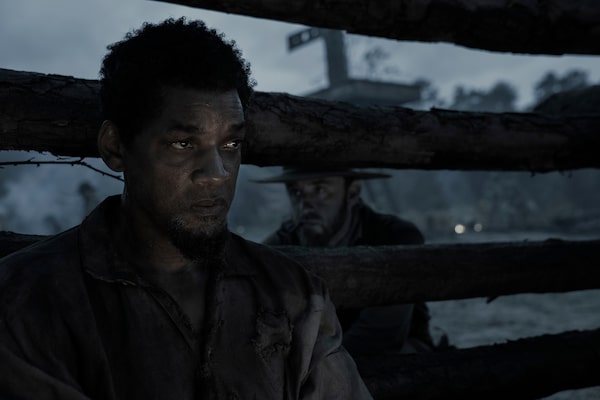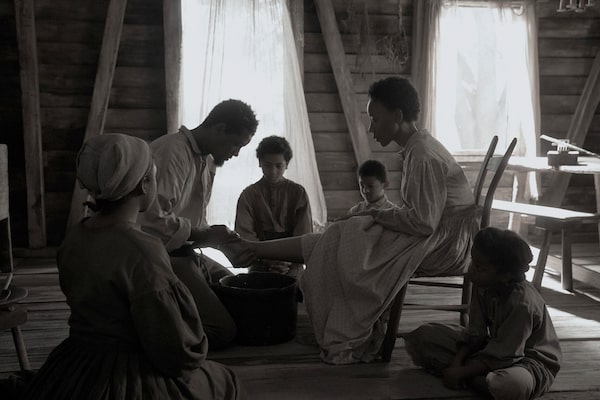
Will Smith in a scene from Emancipation.Quantrell Colbert/Apple TV+ via AP
- Emancipation
- Directed by Antoine Fuqua
- Written by Bill Collage
- Starring Will Smith, Ben Foster and Charmaine Bingwa
- Classification R; 132 minutes
- Streaming on Apple TV+ starting Dec. 9
To get this out of the way: Will Smith is still a movie star, with all the onscreen presence, energy and magnetism that such a label connotes. Does he still deserve to be a movie star? I’m going to say that he certainly should stay clear of any awards stages for the foreseeable future. Just as he should help quash the lightspeed image-rehabilitation campaign that his team has been engaging – a PR push that is testing with a queasy ease both the media’s ability to toe the Hollywood-access line and the general public’s capacity to forgive the rich and famous without second thought.
But can Will Smith still headline a movie with all the superstar charisma that landed him his (deserved) first Academy Award for King Richard? The new film Emancipation argues yes, with caveats.
Set during the final stretch of the Civil War, Antoine Fuqua’s new thriller is a sometimes riveting, sometimes undercooked concoction that attempts to marry the grit-your-teeth violence of its director’s best action films (Training Day, The Equalizer, Olympus Has Fallen) with the sombre tone of such contemporary slavery dramas as 12 Years a Slave. In execution, though, Emancipation more closely approximates an ungainly mash of Fuqua’s crassest and dullest spectacles (Infinite, Tears of the Sun) and the shallow drama of Nate Parker’s Birth of a Nation.

Family scenes bookend the film, but the audience doesn't really get to know anything about Peter beyond the fact that he is a man on the run.Quantrell Colbert/Apple TV+ via AP
Loosely based on the true story of an enslaved man who escaped a Louisiana plantation in 1863 just after Abraham Lincoln signed the Emancipation Proclamation – and whose horrid injuries from whipping were captured in a photograph that was circulated by abolitionists around the world – Fuqua’s film is essentially one long chase scene. Torn from his family, constantly brutalized, but steadfast that God will provide him safe passage in either this or the next world, Peter (Smith) is a being of pure determination. As he evades his captors and wards off snakes and other swamp predators, Peter lets nothing stand between him and his quest for freedom, giving the film’s narrative a natural means of propulsive, ever-forward motion.
And when Fuqua decides to stick with one genre and play within it – whether it be the tender family scenes that bookend the film, or alternately the harsh violence of a third-act battle between Union and Confederate soldiers – Emancipation mostly works in a stand-alone kind of manner. The central problem is that the film constantly shifts its aim from moment to moment, with only one Smith’s presence left to anchor the goings on at any one given second. But that is a mighty impressive presence to have.
Afforded little onscreen dialogue but many prosthetic injuries, Smith gives his hero a steely yet somehow warm resolve that demands attention from beginning to end. The evils of slavery are piled around and on top of Peter, to the point that Fuqua’s decision to desaturate his film’s colours to an almost black-and-white palette seem less like a decision to sensitively depict atrocity in a Spielberg-ian fashion and more an attempt to pre-emptively avoid charges of engaging in crimson-soaked exploitation of the grindhouse variety. Yet through it all, Smith’s performance grounds the horror in a place of courage, heart and soul.

Ben Foster's Fassel is another lout in the actor’s long line of spit-worthy villains.Quantrell Colbert/Apple TV+ via AP
If only we got to know just who Peter was beyond a man on the run. Aside from those aforementioned moments featuring Peter’s wife (Charmaine Bingwa) and young children – and his too-brief interactions with other men on the run – Emancipation offers few details on the inner life of its hero. Curiously, Fuqua and screenwriter Bill Collage spend far more time developing the back story of Fassel, the man determined to hunt Peter down. As played by Ben Foster, the despicable Confederate lout is another in the actor’s long line of spit-worthy villains – you cannot wait until he gets chewed up by a gator or trampled by his horse.
All this adds up to a quote-unquote comeback project for Smith – one that was filmed long before he decided to assault a fellow performer in front of the entire globe – that isn’t a comeback at all. If the 2022 news cycle was at all normalized (oh, to dream), Emancipation would enter and leave this world as a well-meaning but slight reminder of Will Smith’s innate stardom.
 Barry Hertz
Barry Hertz